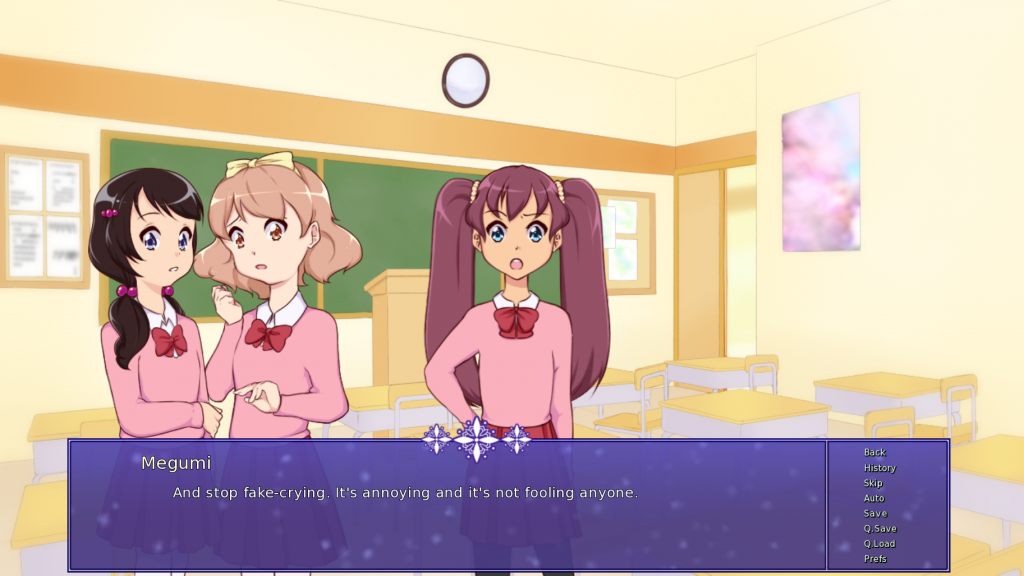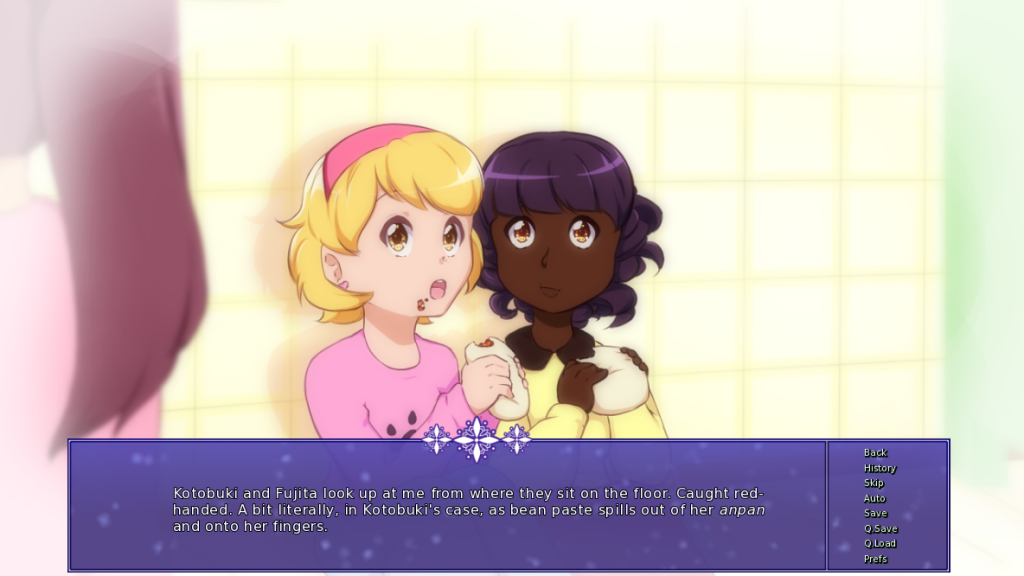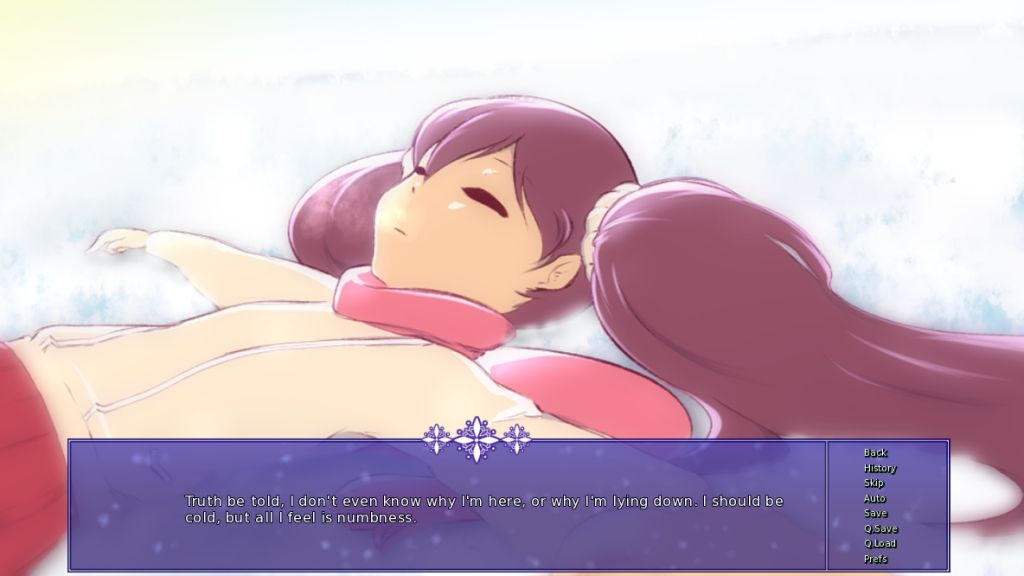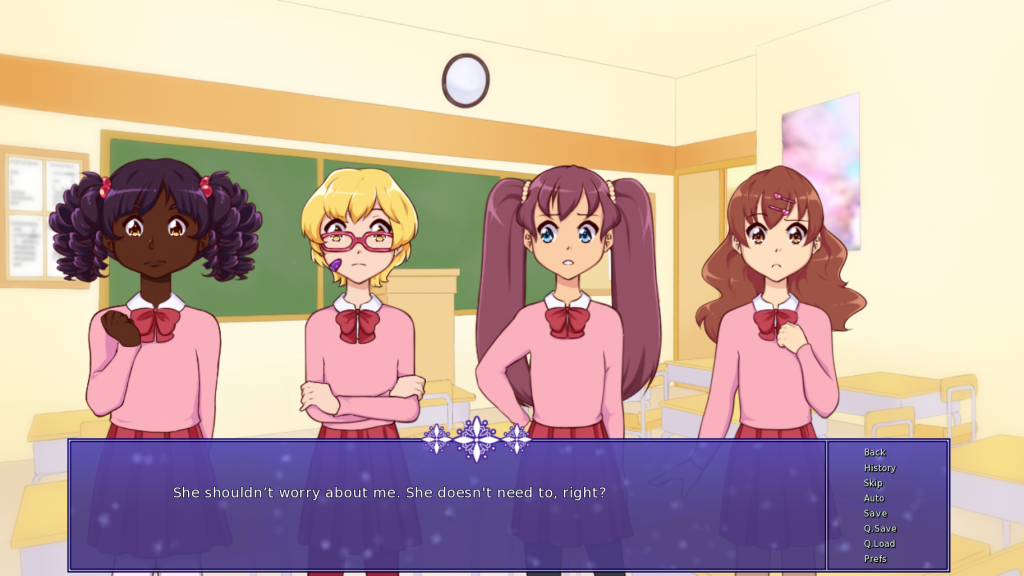From Butterfly-Latte, warm is a kinetic novel that follows the story of young girl Megumi Shimizu as she trudges through the monotony of grade school life. When likable transfer student Hinata Mikami upturns her words, she comes to think that the cold, emotionally distant life she’s built for herself seems less and less appealing.
A review for this game was requested through the VN Game Den review request form, and a review copy was provided.

With soft colors mostly in pinks, oranges, and yellows, the art strikes with an almost childlike quality. It’s not poorly constructed or rendered, however. The flat simple backgrounds can be a little underwhelming sometimes, but they have a wistful nostalgic feel to them. The sprites are round and gentle without feeling overly cartoony. It’s a style that complements its primarily child-aged cast and services its charming character design very well.
There’s not a lot of movement from scene to scene as far as expression changes and interaction in the space. As a whole, it makes up for this with a fair number of very lovely CGs. They’re endearing and they bring a lot of extra charm to the characters. Paired with a perfectly crafted, occasionally melancholy soundtrack, the game is extremely good at touching on then moving through dramatic beats with ease.
The story itself is a classic coming of age. Megumi is a young girl who’s a bit prickly and morose, and has trouble making friends. After meeting Hinata, a transfer student, she starts to see changes in herself and her relationships with her friends and her single father. It very much leans into that style of storytelling. If that’s not your cup of tea, then this is definitely one of those that might have a harder time holding your attention. That being said, though, it’s filled with these wonderful little character moments. You really learn to love Megumi, Hinata, and the others as they grow and change and get closer over the course of the story.

It does some make very interesting narrative choices that are hard to just hand-wave away, though. It has an American developer, but they lean on some very specific Japanese cultural tokens. The game doesn’t feel or even look like it’s actually set in Japan, though. They all have Japanese names, there’s a lot of Japanese food, and it seems like they’re referencing a more Japanese school structure, but it stops just short of actually embracing a more authentic Japanese environment. Not that a section of Japan couldn’t look like this game portrays it, but it comes across as an interpretation of Japan from a distanced pop media perspective. I feel like they trapped themselves in the mindset that because it’s a visual novel it needs to be Japanese, instead of creating an authentic environment for these girls to live in and react to no matter what the country happened to be.

I also have a hard time believing the main cast as eleven year olds. At first, I thought it was a little strange how often the kids were left to their own devices, but I chalked that up to a creative interpretation of childhood. More than that, though, I was a little skeptical of the way Megumi expresses herself through the first person. Her perception of the world as presented through narration feels like it belongs to someone much older. Not that she can’t be mature or intelligent or have the thoughts she does, but it’s another place that doesn’t feel like an authentic experience. I just don’t feel like it’s a sixth grader telling this story.
The age becomes such a huge sticking point for me simply because of the romantic undertones in Megumi and Hinata’s relationship throughout. They aren’t sexual, by any means, and that’s not to say that girls this age can’t or don’t experience romance. The game doesn’t present a cutesy, bumbling kid romance, though. It gives them something that I see as being more at home in a soft adult or late teen romance. To me, the game just consistently forgets that it’s dealing with little girls, and that makes certain scenes read very strangely when you, as a player, suddenly remember that. I can’t help but think that if they considered just aging the cast up even a few years, a lot of this weird in-between feeling wouldn’t be present.

warm, ultimately, is soft and gentle and a great fit for those who’re looking for a character-driven coming-of-age story that likes to linger in introspection. While it has its minor faults, it’s still a lovely little story about growing up and turning into a human being that can live in the rest of the world. Purchase it on itch.io.







